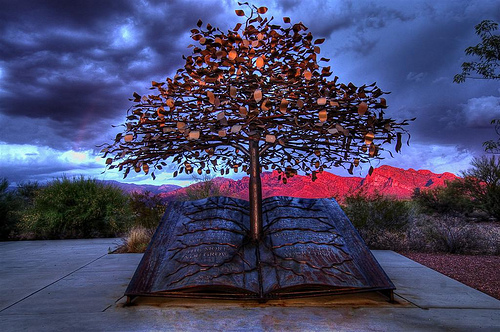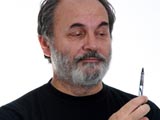Philactosophy and Other Neologisms
by Tarık Günersel / May 10, 2013 / No comments
Tarık Günersel and his philosophy of action: Be as fruitful as you can.

'Tree of Life' sculpture at the Oro Valley Library in Arizona. Photo: daveintucson via Flickr.
Let’s start with the term “philosopher.” A flexible translation of this word would be “wisdom-lover.” But maybe this doesn’t say enough; beyond acquiring knowledge there should be another side to the wisdom-lover: “Philosophers have hitherto only interpreted the world in various ways; the point is to change it.” You know who said this.

- Life is words in action, literature is action in words.
Humans are about to destroy their spaceship Earth. Some of them are aware of this and they try to change the course of events. Will they succeed? Will more humans be alarmed and do something?
Literature is vital and translators are messengers of world peace.
Though I shall focus on the literary scene in Turkey and its problems regarding freedom of expression, I shall not omit the other parts of our planet. Today local is global and vice versa. 
- Tarık Günersel is a poet, playwright, aphorist, librettist and short story writer. He is the president of PEN Turkey and an ex-member of the PEN International Board. He studied English Literature at Istanbul University. A self-exile after the military coup in 1980, he spent four years in Saudi Arabia with his wife Füsun and their daughter Barış, teaching English. A dramaturg at Istanbul City Theater since 1991, he has acted on stage and screen and directed some of his plays. He proposed World Poetry Day in 1997 which was accepted by PEN International and declared by UNESCO as the 21st of March. His translations into Turkish include works by Samuel Beckett, Vaclav Havel and Arthur Miller. His works include The Nightmare of a Labyrinth (mosaic of poems and stories), and How’s your slavery goin’? His Oluşmak (To Become), a “life guide for myself,” includes ideas from world wisdom of the past four millennia.
If we take this to be true, we now come to a “wisdom-and-action-lover.” Though wouldn’t a single word for this be nice? How about philoactosophy? That would be good, but a friend suggests getting rid of the first ‘o’ and making it: Philactosophy. A philactosopher: Marx.
True, this word is a mixture of Greek and Latin elements. Fine with me. But there is the Greek alternative to acto: praxis, practo. Philopractosophy? I like it, but since the combination of praxis and philosophy have been used to signify Marxism, maybe we should have a broader term. So philopractosophy (the active devotion of a Marxist) could be a subcategory of philactosophy (love of action in relation to a certain philosophy).
Naturalism and Anaturalism
Nature. Concepts of nature. Concepts of God/s.
Basically, within this topic there are two First Assumptions:
1) Nature is “self-sufficient.” No need for an external cause. (Naturalism.)
2) Nature was created by a supernatural being (God), who is self-sufficient. (Supernaturalism.)
This universe may have “started” 13.7 billion years ago, but if we use the words “nature” and “universe” in different senses, then we can say that it was only the beginning of this universe and not that of nature.
Pantheism implies identicality between Nature and God. Nevertheless, it is still a kind of theism. Which brings up another point…
Atheism, anti-theism, post-theism, and non-theism are all “dependent” terms. They are the results of placing theism in the center and taking a position in relation to it. I don’t like this dependency, so I prefer the term naturalism.
And, likewise, instead of the terms supernaturalism and non-naturalism, I coin and suggest the term anaturalism.
But then there is antinaturalism as a reaction to one version of naturalism. Antinaturalism could be summarized like this: “Exploitative human relations cannot or should not be legitimized by accepting jungle relations as normal. Some people should not become the prey of others.” A good warning, which enriches my conception of naturalism. As it stands, I am aware of a variety of critiques and discussions on this topic, and although I’d love to use a term such as postnaturalism, I tend to keep my terminology as simple as I can.
As for “postmodern religious naturalism,” I prefer to stay away from all religions and their derivatives. Yet I’ve been trying to understand them and incorporate some of their elements into my philosophy. Ooops: Philactosophy.
Contributive Naturalism
Skipping terms such as materialism and objectivism for the sake of word economy, I consider myself a naturalist who tries to contribute to Earth Civilization.
Naturalism is a philosophical position. Contributive naturalism is a philactosophical position.
Hope management
… goes hand in hand with fear management. Various kinds of leaders know about these systems of management.
As a contributive naturalist, with no post-death hopes, I simply try to be as fruitful as I can. Like a tree.
Did I say “with no post-death hopes”? Not exactly: I will cease to exist as a subject, but I hope I will leave a few good traces behind that will lead to chain-reactions.
Theists and atheists, naturalists and anaturalists can be co-travelers in the construction of Earth Civilization. The journey has begun. In fact, a long time ago. And half of the glass is full.




